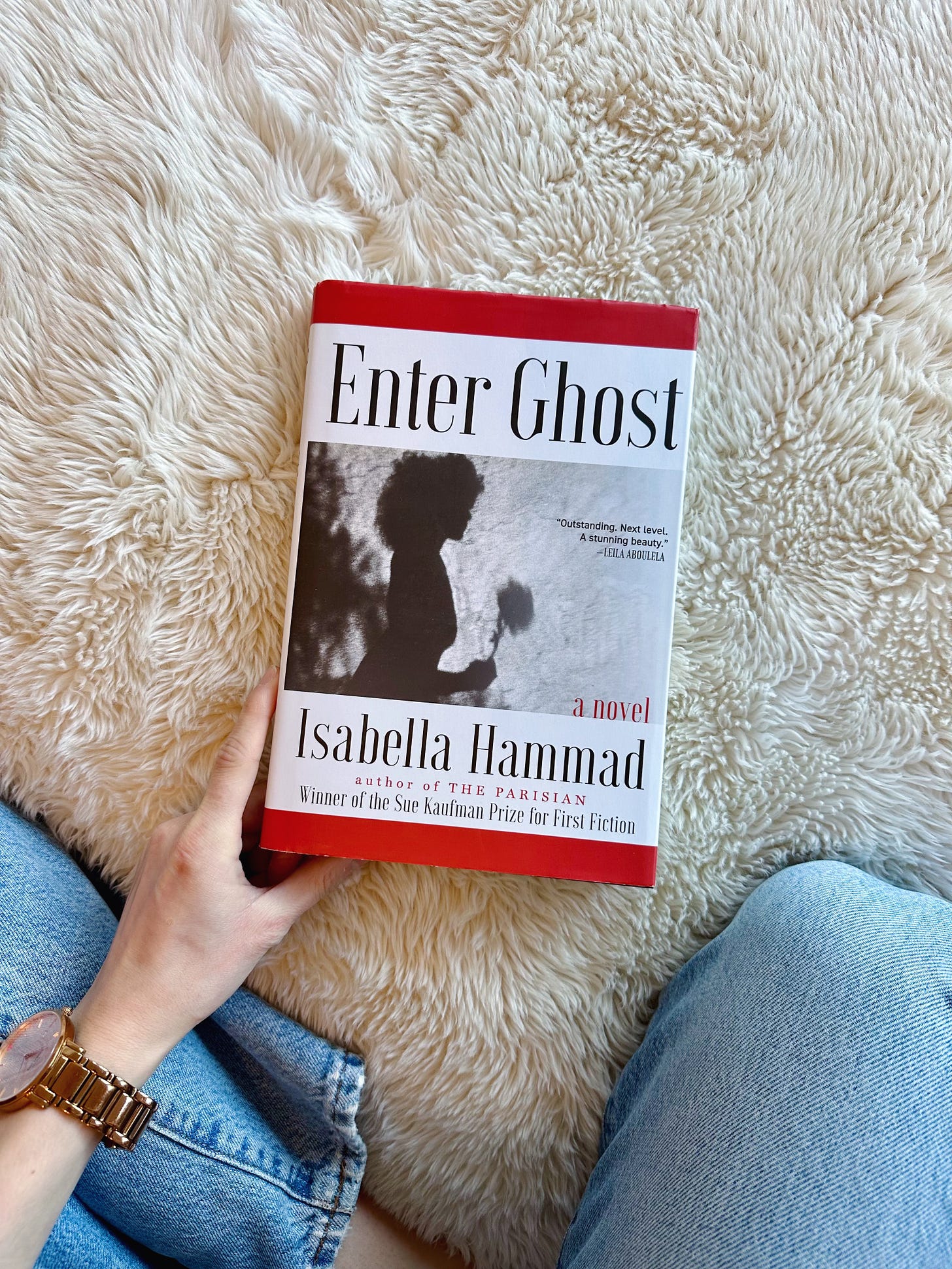[Dear readers: This issue contains discussions of colonialism and military/police brutality.]
Haunting, adjective: “Poignant and evocative; difficult to ignore or forget.”
When one conjures the image of a haunting, ghosts are likely to come to mind. But are they ghosts of the past, or of the present? Enter Ghost, Isabella Hammad’s second novel, uses Hamlet as a vehicle to explore protagonist Sonia’s identity as a thirty-something-year-old, diasporic Palestinian woman (Grove Press, 2023). Ultimately, Enter Ghost confronts ghosts, but not of deceased individuals; rather, societal, cultural, and historical.
“I expected them to interrogate me at the airport and they did,” starts Enter Ghost (Hammad, 1). After landing at the airport to visit her sister in Haifa, Sonia finds herself, and her sense of self, questioned. “They particularly wanted to know about my family links…they unzipped my bags…led me into a different room for a strip search” (1). A scene all too familiar to traveling Palestinians, the interrogation immediately situates the reader amongst a question that haunts Sonia: who is she, and what is her relationship to Palestine?
When she attaches herself to a production of Hamlet in the West Bank, Sonia’s ghosts further reveal themselves. She’s no longer a young actress, and her career’s future is in question. Her failed marriage and attempt at motherhood have left her isolated. She hasn’t visited Palestine and her sister in years, and she realizes she knows very little about her family’s history and present. Her understanding of Palestinian resistance and experienced violence is distant, built on childhood memories, recounts, and news reports. “I may not have locked eyes with this fact yet, but I wasn’t only here for Haneen…I hadn’t prepared myself for this bodily impact, the memory of my senses” (2).
And it isn’t until Sonia begins to confront these senses, her ghosts, her hauntings, that she starts to see freedom. She begins to break from the expectations of others, of society, of the settler state that has taken her homeland. “Did they believe they were guarding against a group of Muslim fanatics? We, the backward natives. Did they genuinely believe they were waging a war against Islam, or Islamists, as they liked to paint it in the media sometimes, when they claimed solidarity with victims of terror attacks in Western capitals, saying, We know how it feels, it’s just like what we have to go through? Or did some of them know what they were really doing? Or was that something they avoided thinking about? Not my fear but my pride was pulsating through me now. Let them think we were fanatical. I did not care. I discovered I was proud that they might think it of me” (271).
“Mark me I am thy father’s spirit. Enter Ghost,” ends the novel (319). The murdered King Hamlet has approached his name bearing son to tell his story and encourage him to take action. As the novel’s final line, the play is cut before we see Hamlet’s arc. An inconclusive ending, an unfinished play. But we’ve seen Sonia confront her ghosts. Just as the line becomes a catalyst for Hamlet, “Enter Ghost” becomes a catalyst in the novel. Through King Hamlet, Hammad brings in the voices of generations of Palestinians, urging the actors to respond. But what happens next is not just on the actors, but also on us readers. Hammad calls us to see the violence laid bare before us, and fight for Palestinian liberation, memory, and self.
Fighting for Palestinian Liberation
A book can teach us about inequities, but it cannot fix them. We can learn about history, but it’s on us to create the future. Hammad’s novel provides readers no simple pathway or action items to take when fighting for a free Palestine (nor does she have any obligation to). Rather, she shows resistance in different forms, and leaves the resistance’s end open to us.
Even if news coverage diminishes (or is never accurately there to start with), that doesn’t mean the issue goes away. Our fight must be continuous. Our amplification of stories and truth must be continuous. Reading is political; when coupled with action, it can lead to structural change.
Find action items you can take in our recent post.
“When they look at their soldiers, they see sons and daughters. When we look at their soldiers, our hearts also beat harder, although it is for different reasons.”
—Enter Ghost, p283
Other’s thoughts on Enter Ghost
“Hammad draws keen observations on performance, how Palestinians are forced to constantly perform their suffering for others, how even artistic performance is fraught with danger and politics under occupation.” —@hilaryreadsbooks
“I found this novel to be a unique perspective into the art and theater scene of modern Palestine, with the author basing the setting and happenings of her story on theater sources consulted throughout Palestine. The production of the play dominates the story, but the subtle development and growth of characters throughout the drama culminates in a wonderful story of growth.” —@yazeeds.reads
If you liked Enter Ghost, read…
The End of August by Yu Miri, translated by Morgan Giles
The Parisian by Isabella Hammad
**Note: We receive a small commission on any sales made through our affiliate links.
Thanks so much for taking the time to read! If you enjoyed this newsletter, please share with friends, and consider subscribing if you have not yet already.
We’ll be back in just a few weeks with our end-of-month issue to break down current topics in the publishing world.
Xx,
ad astra




